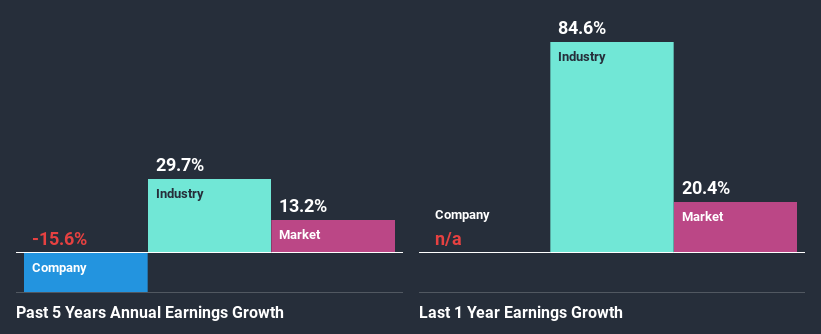- Poland
- /
- Entertainment
- /
- WSE:TBL
Do Its Financials Have Any Role To Play In Driving T-Bull S.A.'s (WSE:TBL) Stock Up Recently?
T-Bull's (WSE:TBL) stock is up by a considerable 45% over the past three months. We wonder if and what role the company's financials play in that price change as a company's long-term fundamentals usually dictate market outcomes. Particularly, we will be paying attention to T-Bull's ROE today.
Return on Equity or ROE is a test of how effectively a company is growing its value and managing investors’ money. Put another way, it reveals the company's success at turning shareholder investments into profits.
See our latest analysis for T-Bull
How To Calculate Return On Equity?
The formula for ROE is:
Return on Equity = Net Profit (from continuing operations) ÷ Shareholders' Equity
So, based on the above formula, the ROE for T-Bull is:
26% = zł4.7m ÷ zł18m (Based on the trailing twelve months to September 2020).
The 'return' is the yearly profit. Another way to think of that is that for every PLN1 worth of equity, the company was able to earn PLN0.26 in profit.
Why Is ROE Important For Earnings Growth?
So far, we've learned that ROE is a measure of a company's profitability. Based on how much of its profits the company chooses to reinvest or "retain", we are then able to evaluate a company's future ability to generate profits. Assuming all else is equal, companies that have both a higher return on equity and higher profit retention are usually the ones that have a higher growth rate when compared to companies that don't have the same features.
T-Bull's Earnings Growth And 26% ROE
Firstly, we acknowledge that T-Bull has a significantly high ROE. Additionally, a comparison with the average industry ROE of 24% also portrays the company's ROE in a good light. However, while T-Bull has a pretty respectable ROE, its five year net income decline rate was 16%. Based on this, we feel that there might be other reasons which haven't been discussed so far in this article that could be hampering the company's growth. Such as, the company pays out a huge portion of its earnings as dividends, or is faced with competitive pressures.
However, when we compared T-Bull's growth with the industry we found that while the company's earnings have been shrinking, the industry has seen an earnings growth of 30% in the same period. This is quite worrisome.

Earnings growth is a huge factor in stock valuation. What investors need to determine next is if the expected earnings growth, or the lack of it, is already built into the share price. By doing so, they will have an idea if the stock is headed into clear blue waters or if swampy waters await. One good indicator of expected earnings growth is the P/E ratio which determines the price the market is willing to pay for a stock based on its earnings prospects. So, you may want to check if T-Bull is trading on a high P/E or a low P/E, relative to its industry.
Is T-Bull Using Its Retained Earnings Effectively?
Summary
On the whole, we do feel that T-Bull has some positive attributes. Yet, the low earnings growth is a bit concerning, especially given that the company has a high rate of return and is reinvesting ma huge portion of its profits. By the looks of it, there could be some other factors, not necessarily in control of the business, that's preventing growth. While we won't completely dismiss the company, what we would do, is try to ascertain how risky the business is to make a more informed decision around the company. You can see the 5 risks we have identified for T-Bull by visiting our risks dashboard for free on our platform here.
If you’re looking to trade T-Bull, open an account with the lowest-cost* platform trusted by professionals, Interactive Brokers. Their clients from over 200 countries and territories trade stocks, options, futures, forex, bonds and funds worldwide from a single integrated account. Promoted
Valuation is complex, but we're here to simplify it.
Discover if T-Bull might be undervalued or overvalued with our detailed analysis, featuring fair value estimates, potential risks, dividends, insider trades, and its financial condition.
Access Free AnalysisThis article by Simply Wall St is general in nature. It does not constitute a recommendation to buy or sell any stock, and does not take account of your objectives, or your financial situation. We aim to bring you long-term focused analysis driven by fundamental data. Note that our analysis may not factor in the latest price-sensitive company announcements or qualitative material. Simply Wall St has no position in any stocks mentioned.
*Interactive Brokers Rated Lowest Cost Broker by StockBrokers.com Annual Online Review 2020
Have feedback on this article? Concerned about the content? Get in touch with us directly. Alternatively, email editorial-team (at) simplywallst.com.
About WSE:TBL
T-Bull
Engages in the production and distribution of games for mobile devices in Poland.
Slight risk with mediocre balance sheet.
Market Insights
Community Narratives



